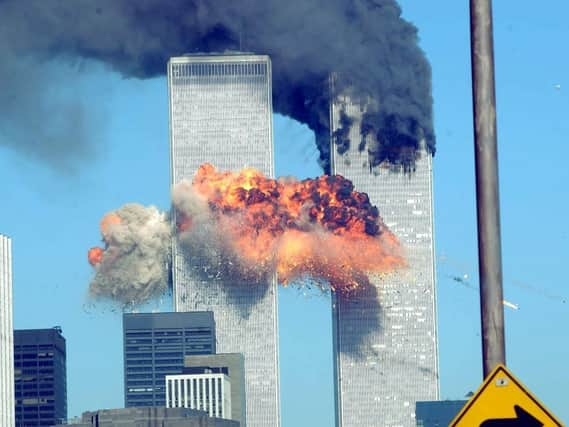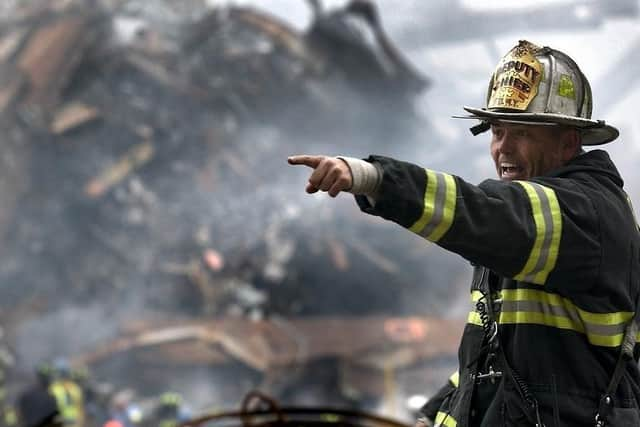20 years on, what have we learned from the attacks of 9/11?


Not since the Cuba missile crisis of four decades earlier had the world held its breath for so long. As the events in New York and Washington continued to unfold on that September day 20 years ago, it was clear that the level of relative stability that the West had taken for granted, had gone for ever.
The date of 9/11 is etched on America’s soul. The death toll was higher than at Pearl Harbour; more than on D-Day. Unlike either of those, the reasons had yet to be understood.
Advertisement
Hide AdAdvertisement
Hide AdThe 20th anniversary that will be marked this autumn will be conducted in a world more afraid than ever of the threat of terror, and as the debate continues on whether the response was wise or proportionate.


The question misses the point, argues Paul Rogers, emeritus professor of peace studies at Bradford University and global security consultant with the Oxford Research Group. The politicians, he says, had their minds made up by the public.
“People say that 9/11 was as bad as Pearl Harbour. That’s rubbish – it was a lot worse,” he said. “Pearl Harbour was a military attack on military targets, before the television age and not even in the continental United States. 9/11 was an attack on civilian targets by people who were obviously seen as terrorists. And the country was caught completely by surprise. That first day there were probably 100m Americans glued to their TV sets, watching with horror at what happened.”
He had seen it coming. In the 1990s he wrote a book called Losing Control: Global Security in the 21st Century, which foresaw the possibility of a catastrophic attack by a rogue state. A new edition will be published in time for this year’s anniversary.
Advertisement
Hide AdAdvertisement
Hide Ad“I said in the book that if there was a major successful attack, the United States would, understandably, not be really interested in who was behind it but in how to destroy them. And that’s what happened.
“The trick would have been to treat the people behind the attack as extremely nasty transnational criminals and use the force of international law to bring them to justice.”
“But the weight of public opinion meant there was never any chance of doing that. And looking back, I think the last 20 years of disrespect have failed.
“We now have negotiations with the Taliban which would have been unbelievable at the time. They control or influence probably the majority of rural Afghanistan. It’s been a pretty grim failure – 20 years of war and counting.”
Advertisement
Hide AdAdvertisement
Hide AdThe picture in Iraq was less encouraging still, he said. “You ended up with an eight-year war, and from the ruins of that you had ISIS rising. The most radical elements survived.”
At the root of the problem, Prof Rogers said, was a failure to address the root cause of the terrorism.
“We should have recognised that while the people at the head of these groups were utterly set in their ways – sometimes with a religious dimension – the people who were drawn to them could have been drawn to something better. We have yet had to address the reasons why we have so much anger and resentment, and the ease with which people can join what are almost cults.”
Dr Andy Mycock, Reader in politics at Huddersfield University, also said the West had failed to address the motivation of those responsible.
Advertisement
Hide AdAdvertisement
Hide Ad“Understanding the causes does not mean trying to legitimate the action. It means just trying to find out what drove the perpetrators,” he said.
“We don’t really have a great deal of understanding about that, beyond the awfulness of the event itself.”
From a cultural perspective, the shock of 9/11 had never really subsided, Dr Mycock said.
“Although we are approaching the 20th anniversary, it still feels like a recent and familiar event. There are certain seminal moments in global history which provide context for how we understand the passing of time. This is one of them.
Advertisement
Hide AdAdvertisement
Hide Ad“We now see the world in a pre and post 9/11 context. It is as fundamental as the Second World War in shaping the way in which we understand industry.”
It was the emotional impact of seeing the attack and its aftermath in real time on TV that led politicians to make judgements they would regret with hindsight, he added.
“9/11 was a coalescing moment. It brought much of the English speaking the world together, but it also fractured the globe more widely than ever.”
A total of 2,977 people were killed in the north-eastern US on September 11, 2001. In New York, 2,753 died when two hijacked planes were intentionally crashed into the World Trade Centre.
Advertisement
Hide AdAdvertisement
Hide AdIn Washington, 184 people were killed when a third hijacked plane crashed into the Pentagon. And in Pennsylvania, 40 people on board a fourth plane died when it crashed into a field, apparently as passengers and crew attempted to retake control from its hijackers.
Two months later, the US released a tape in which Osama bin Laden took responsibility for the attacks. He was killed in 2011 during a raid by US forces.
Support The Yorkshire Post and become a subscriber today. Your subscription will help us to continue to bring quality news to the people of Yorkshire. In return, you’ll see fewer ads on site, get free access to our app and receive exclusive members-only offers. Click here to subscribe.
Comment Guidelines
National World encourages reader discussion on our stories. User feedback, insights and back-and-forth exchanges add a rich layer of context to reporting. Please review our Community Guidelines before commenting.